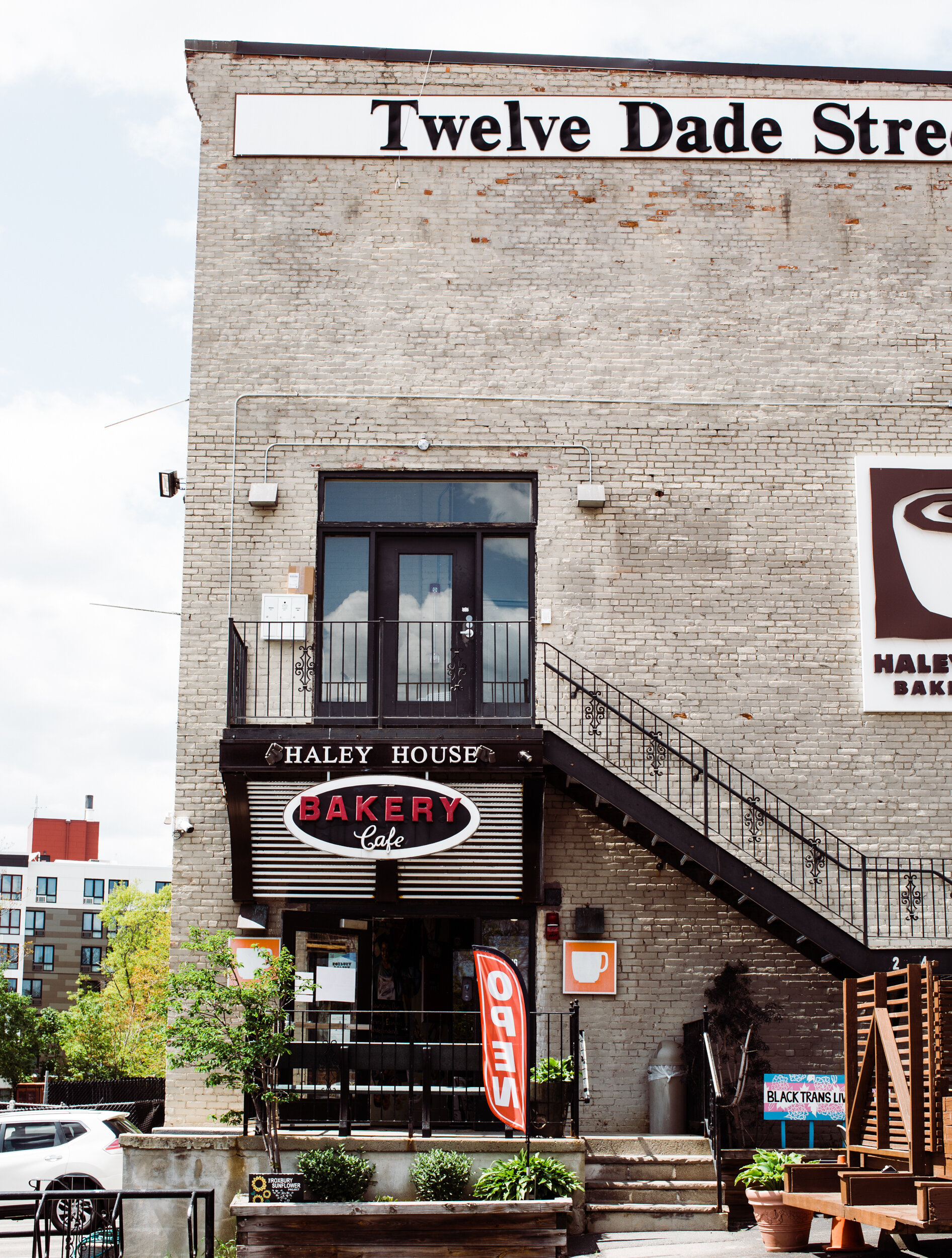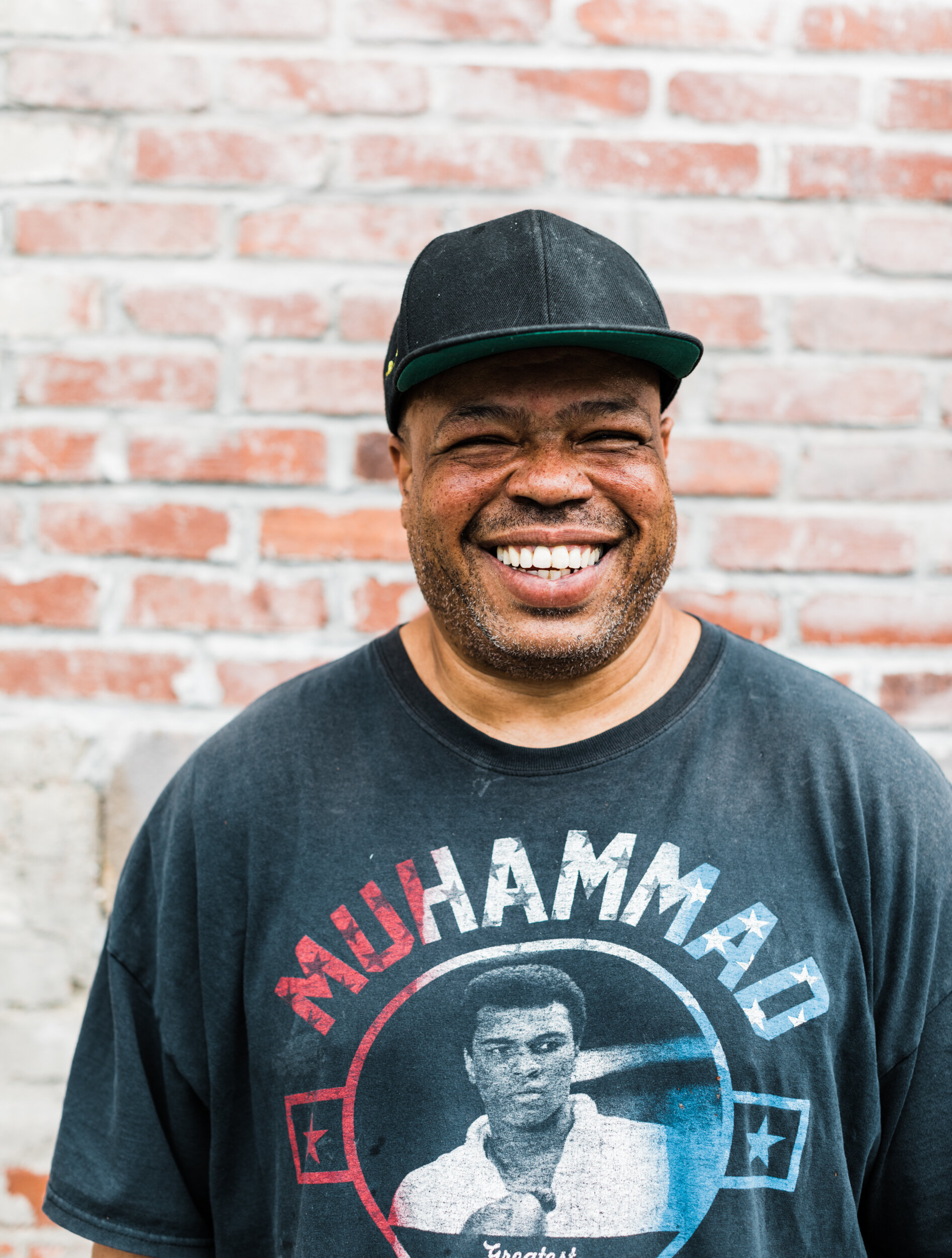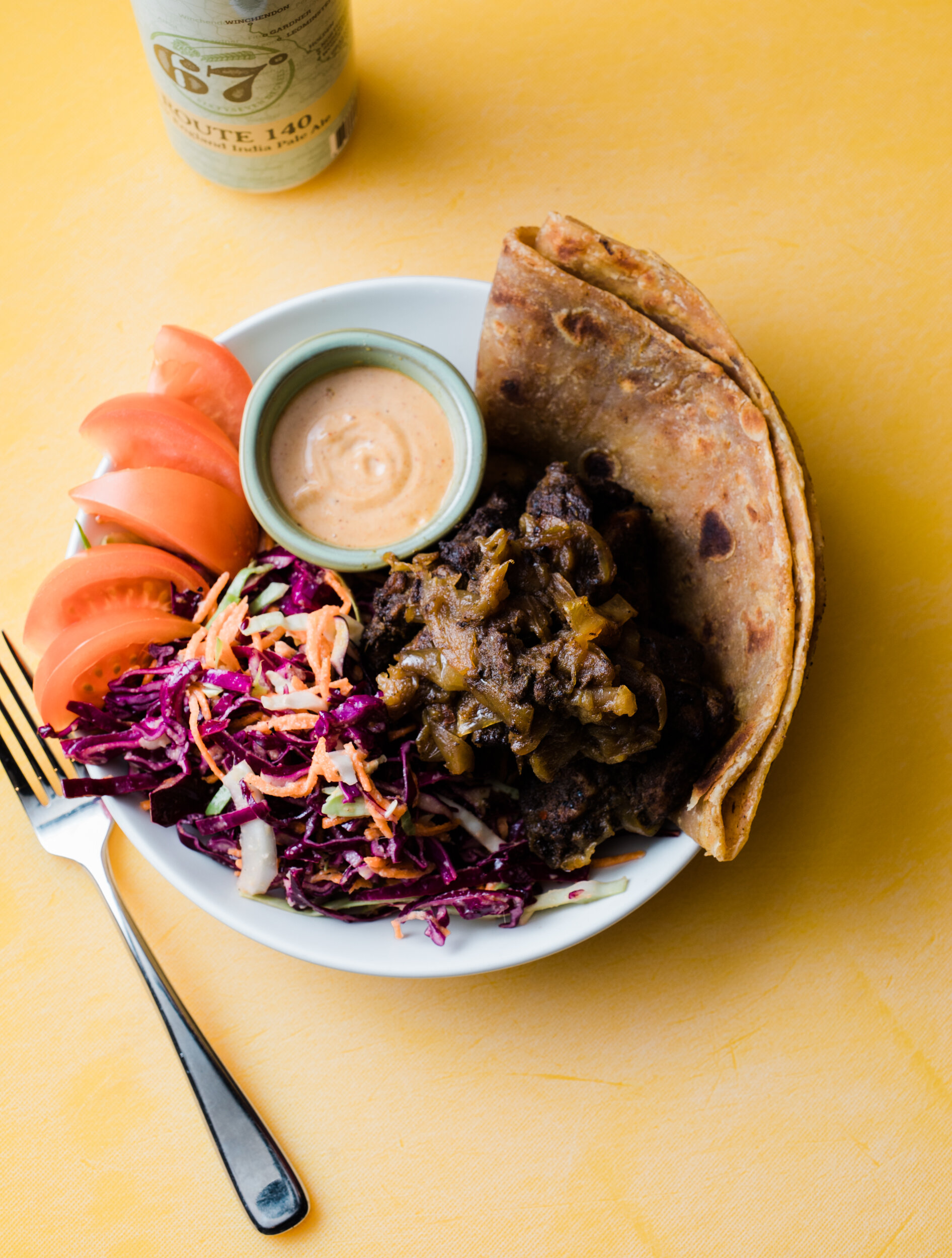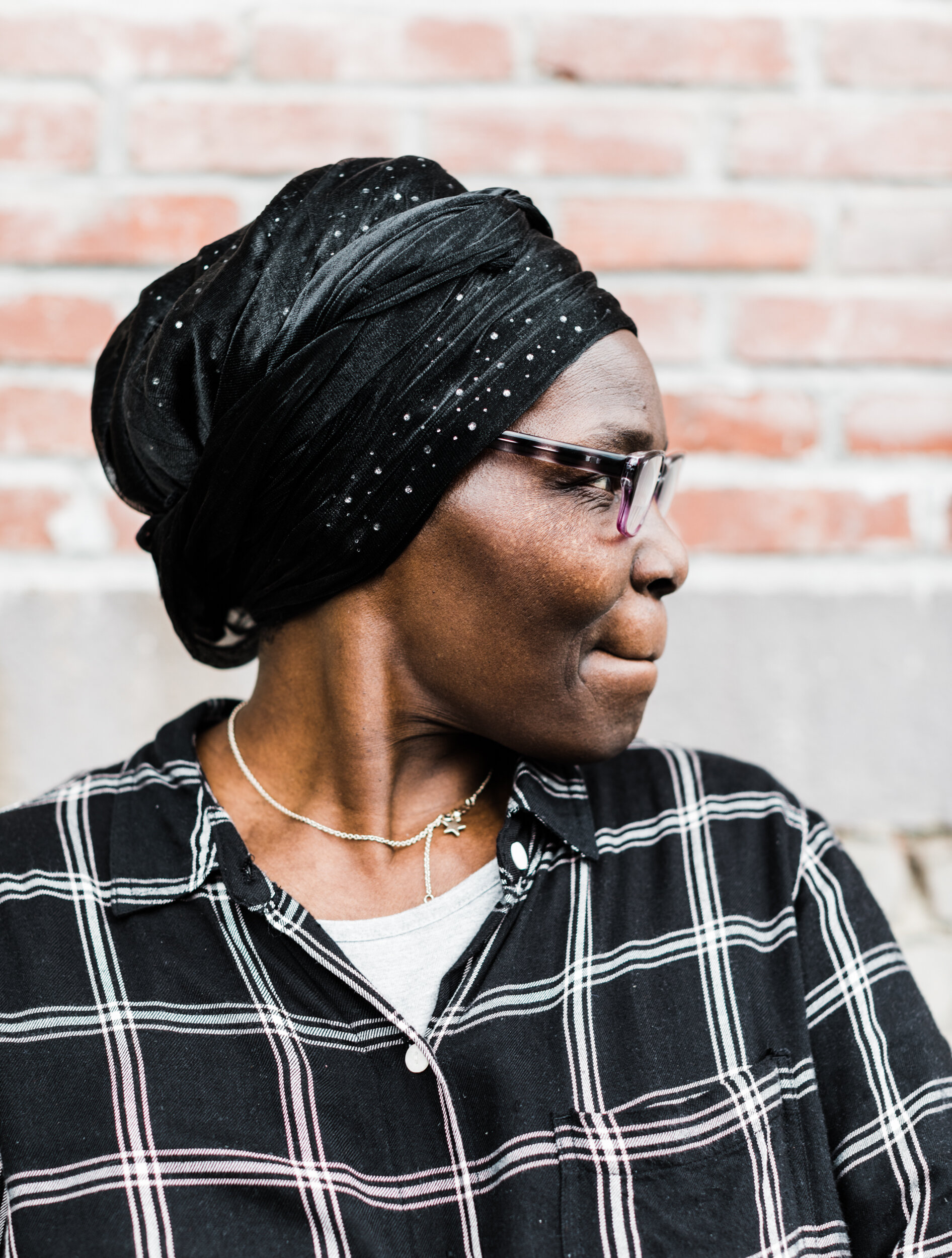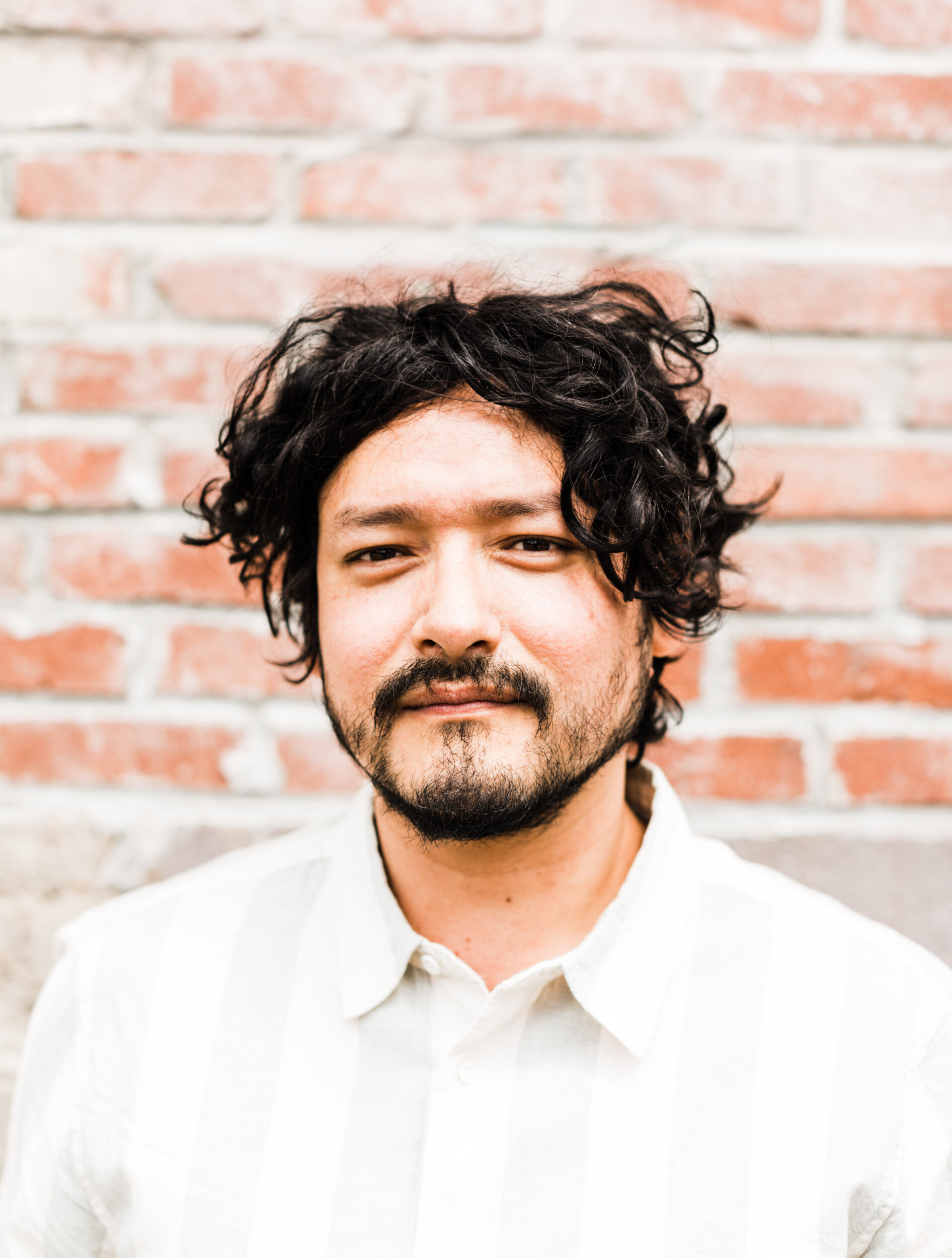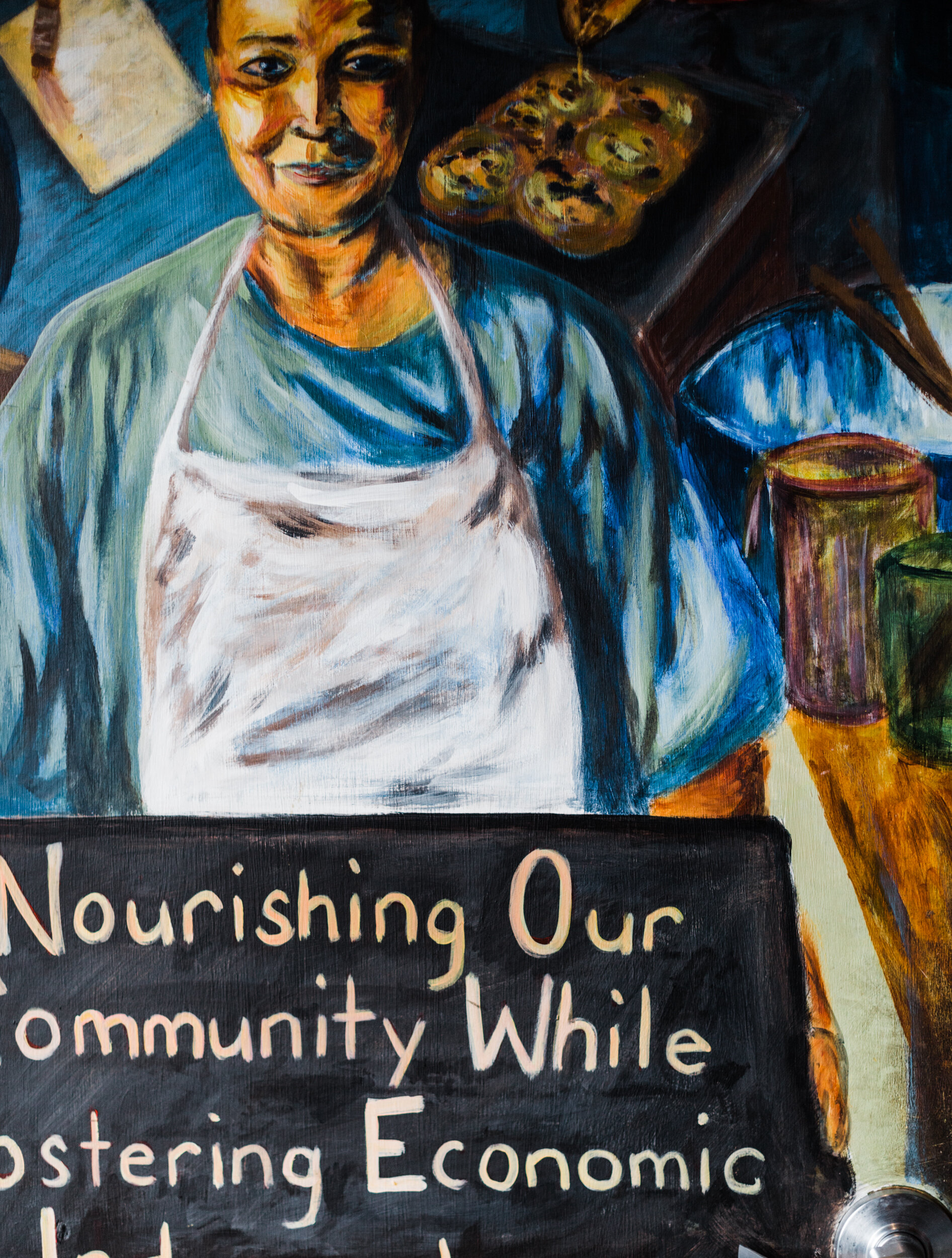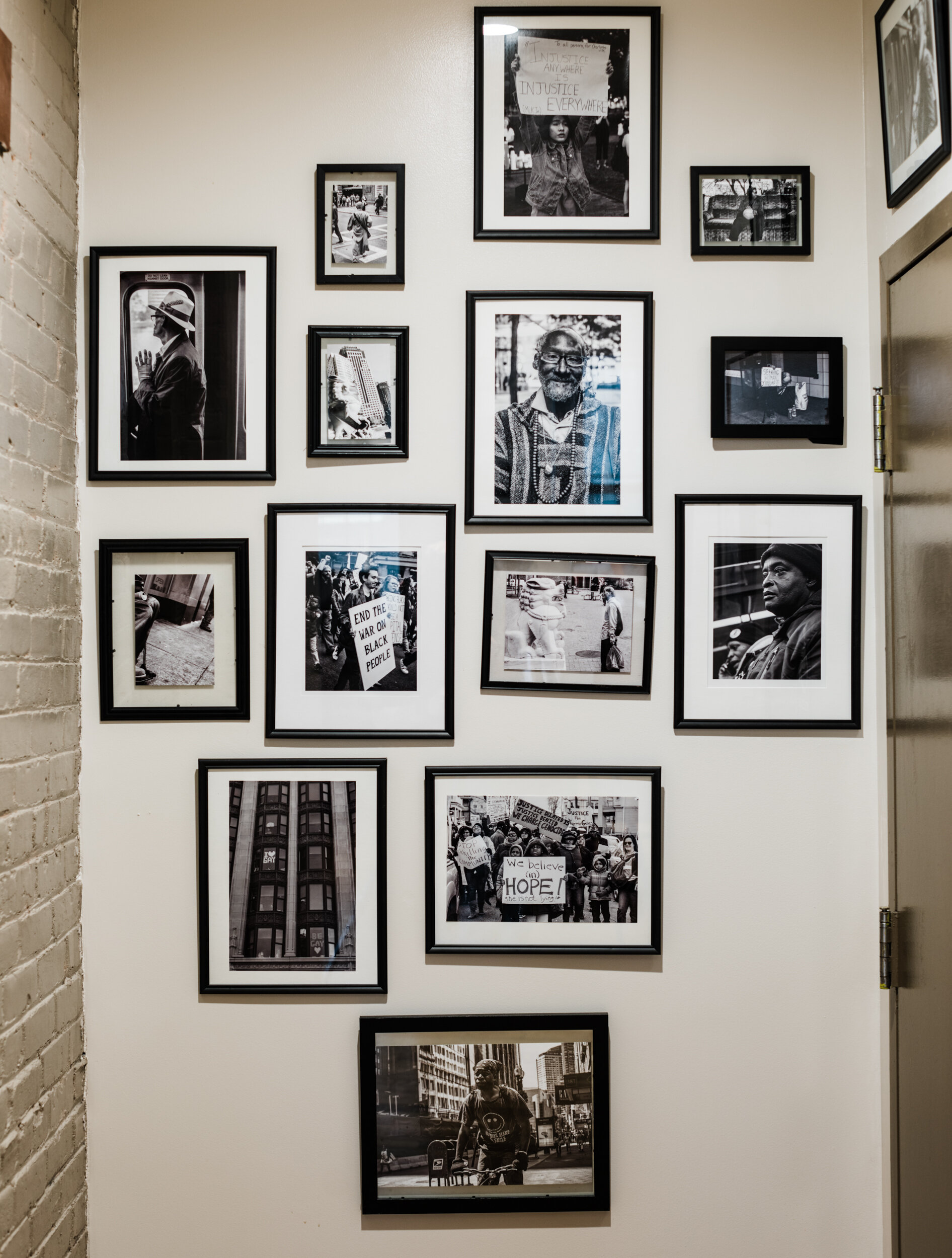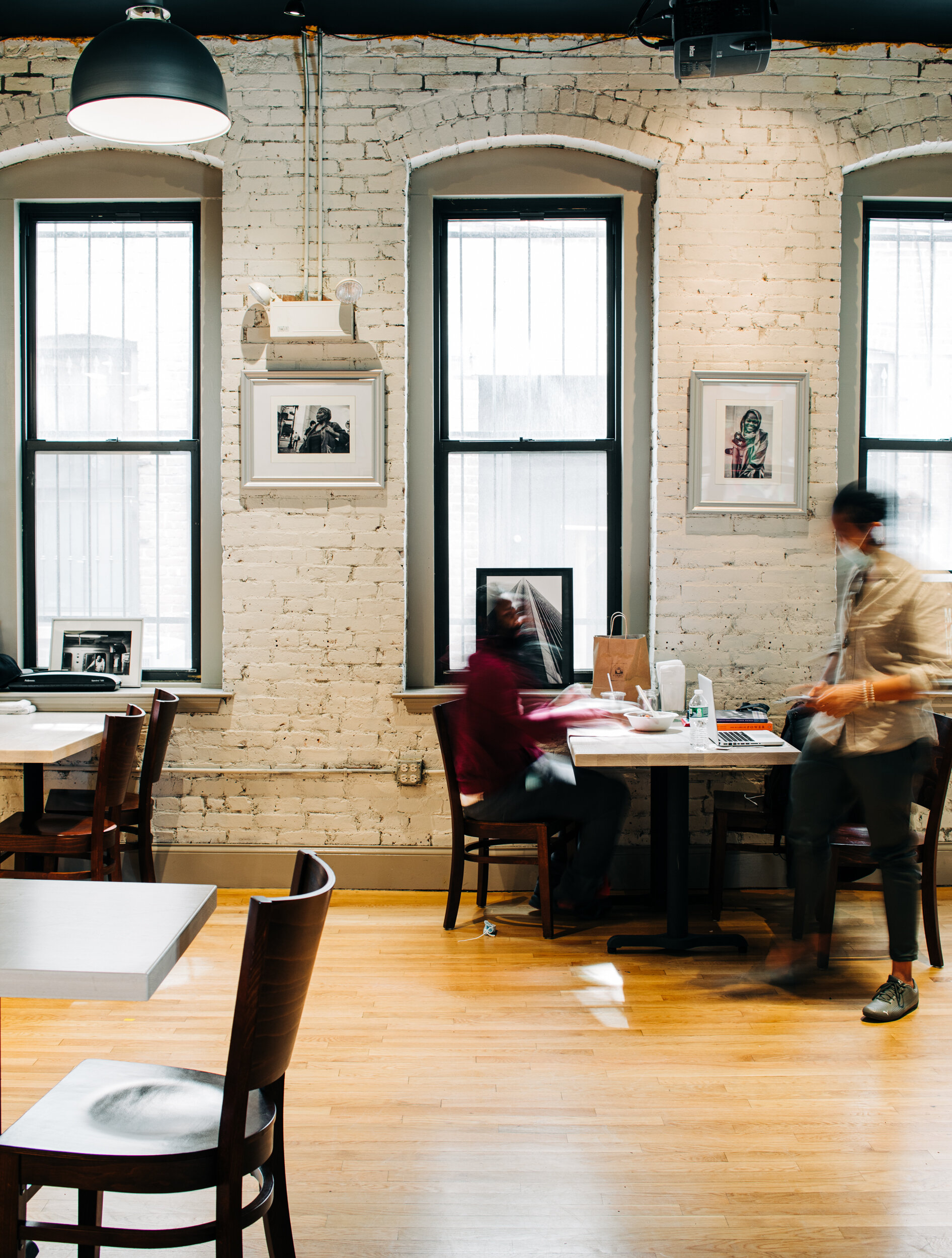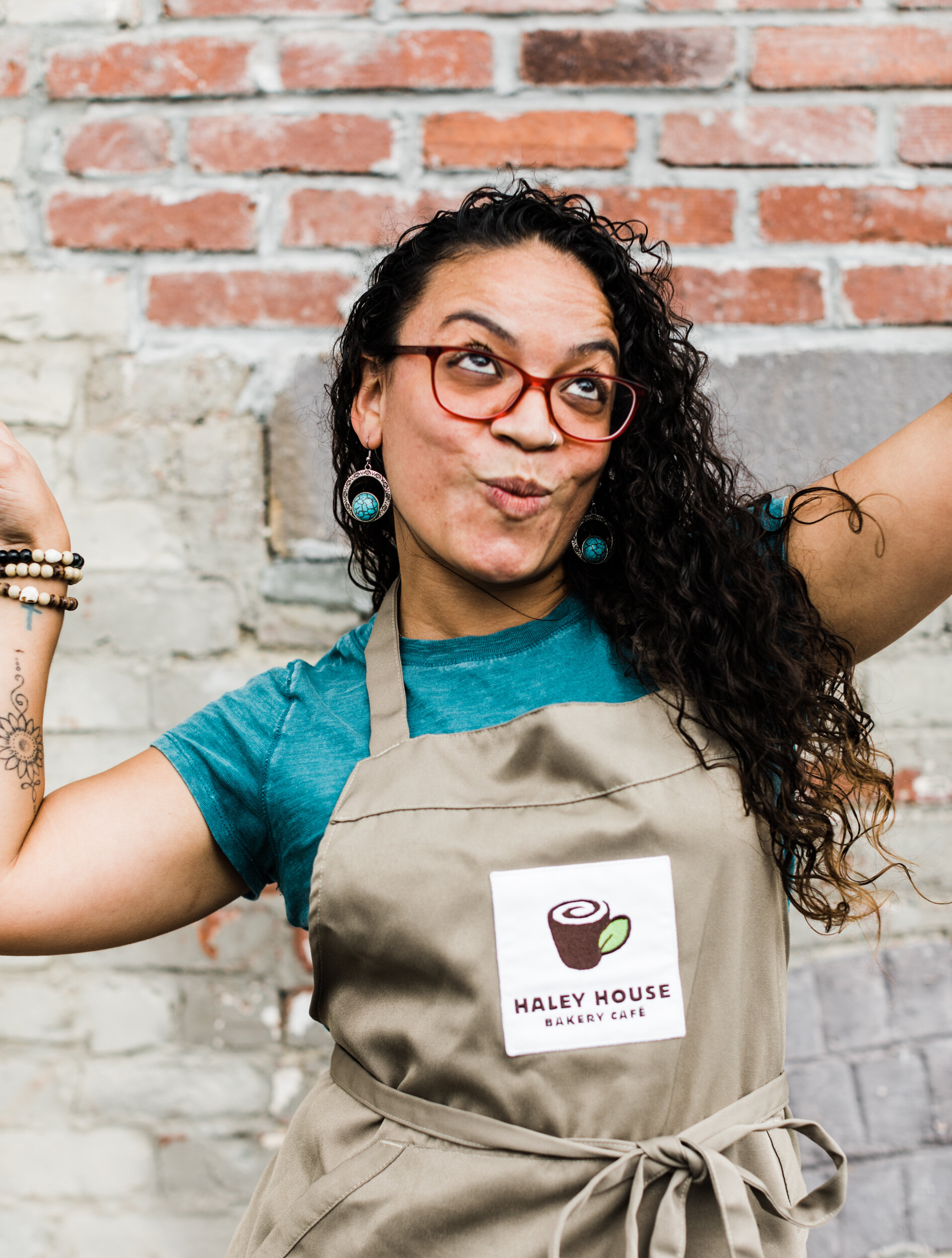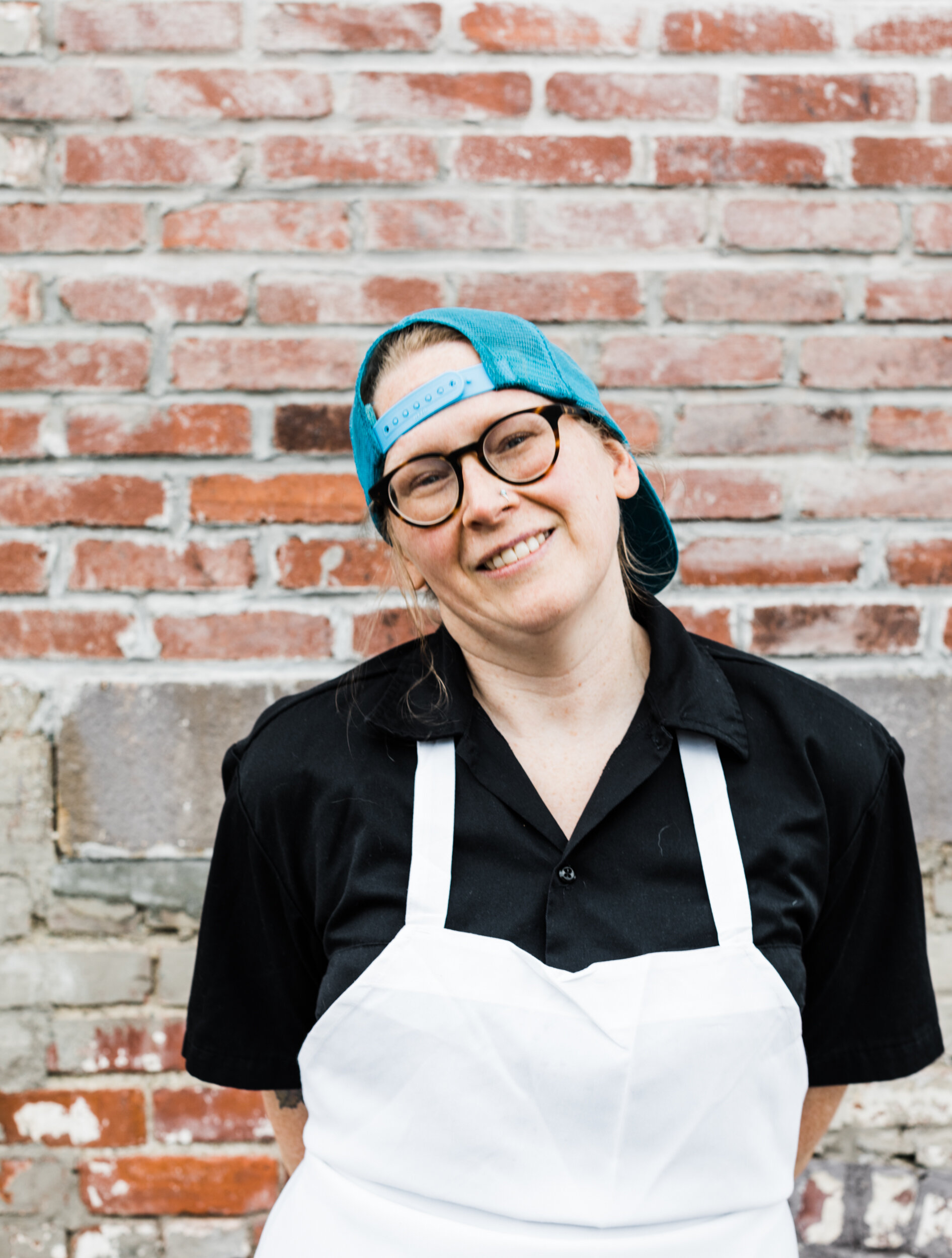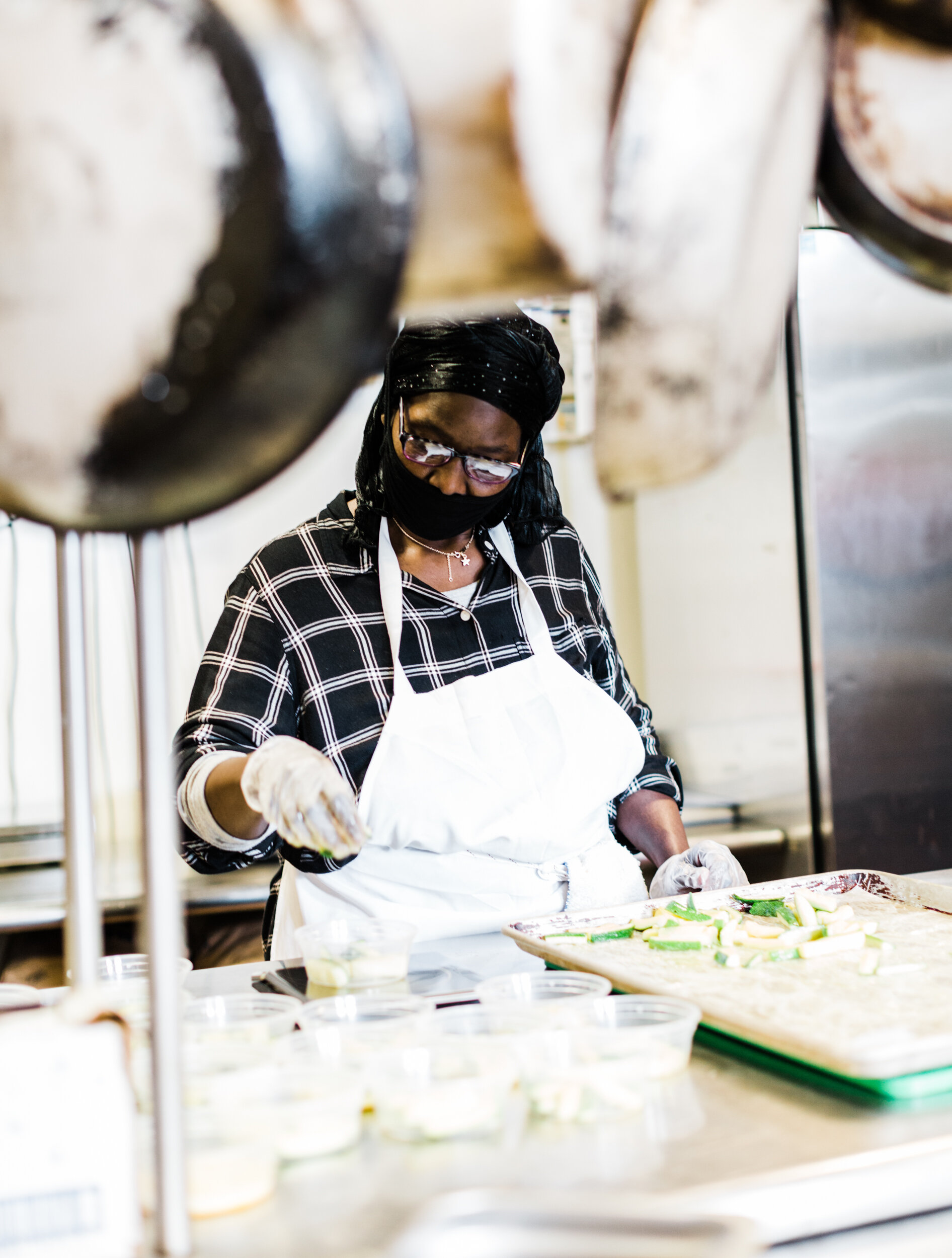Recipe For Resilience: Haley House and the Community Collaborations That Make it Feel Like Home
All photos by Michael Piazza. L–R: Mark Robel, Tony Norman, Victoria Torres, Misha Thomas, Ricardo Monroy, Alima Mbabazi
To nourish means many things: to feed, to fertilize, to foster. Haley House has nourished the Roxbury community physically, nutritionally and emotionally since its founding in 1966. Back then it was a safe haven for Boston’s homeless; now the organization runs a bakery-café, a soup kitchen, a transitional employment program, a live-in community and urban agriculture programs for kids and adults. Above all, Haley House is a hub of support, activity and activism, breaking down barriers between people by welcoming everyone as equals.
Haley House has always adapted to meet the needs of the people it serves. According to co-founder Kathe McKenna, “First we saw that people were homeless and needed a place to stay. Then we saw that they were hungry and they needed food. Then we figured out that people needed permanent housing. And then jobs.”
Nubian Square, the Roxbury neighborhood where Haley House operates, is a diverse, proud and active center of civic life. General Manager Misha Thomas, who came to Haley House in 2019 with a background in fine dining and a passion for food justice, has made local collaborations and a commitment to reflect that diversity and pride, the guideposts of their path forward out of the pandemic.
Boston Mayor Kim Janey, a proud resident of Roxbury and longtime supporter of Haley House, told us, “The general manager of Haley House, Misha Thomas, and her team have curated a space where all feel welcomed and eagerly plan their next visit. She hires people from the neighborhood, offers up space for community events, collaborates with other business owners in the area and goes out of her way to make sure Haley House feels like a home away from home for all. 12 Dade Street in Nubian Square is a wellknown gem in Roxbury, not just because it’s where you can find delicious muffins but because it’s where you find community.”
In a neighborhood with a higher-than-average rate of poverty and an unemployment rate of about 13%, the crippling effects of COVID-19 exposed enormous need. The team at Haley House, despite a decrease from 15 to five employees, stayed open throughout 2020 and got creative in their efforts to serve all members of the community, especially those hardest hit.
The small, determined team focused primarily on menu planning and meal distribution in 2020, while other responsibilities were suspended, like the Transitional Employment Program, which provides support and job training for formerly incarcerated individuals; Take Back the Kitchen, the youth cooking program; in-café dining; and some agriculture programs, too. Haley House’s soup kitchen saw incredible need, serving upwards of 400 meals a day. They were recently granted permission by the City to use the patio, which will allow them to serve even more.
Thinking about where they could make the most impact, and building on a foundation laid by her predecessors, including Chef Ricardo Monroy and designer/curator Kristin Simone, Thomas looked to collaborations with local minority business enterprises (MBEs). She sees partnerships as key to Haley House’s fulfillment of their mission to “use food with purpose and the power of community to break down barriers between people, empower individuals and strengthen neighborhoods.”
Since June 2019, Haley House has worked with CommonWealth Kitchen’s Common Table initiative to get food out to families and the underprivileged. During the pandemic, Thomas says, “There were many groups producing bulk meals. We wanted to prioritize our immediate community and felt CommonWealth Kitchen was mission-aligned.”
“Haley House has been an incredible partner for us throughout the pandemic,” says Jen Faigel, CommonWealth Kitchen’s executive director. “They've participated in our CommonTable emergency meals work and been a core partner with us, City Fresh Foods and the YMCA of Greater Boston through a contract with the Boston Housing Authority to provide 4,000 meals/day to low-income families living in BHA sites across the City. It's a powerful partnership that is putting people back to work feeding neighbors in need.”
Haley House also has a rich history in farming, beginning with the reclamation of NoonDay Farm in 1983, which they ran as a biodynamic, self-sustaining farm until 2012. The farm supplied fresh produce to the soup kitchen and meal programs.
Today, with volunteer help, Haley House runs urban agriculture programs at two sites. The Thornton Street Urban Farm and Community Gardens in Highland Park produces a diverse range of crops, many of which are distributed in the community. At the McKinley Schools, which provide special education for students in grades K–12, Haley House collaborates with teachers and students on the McKinley Collaborative Garden Project. The garden project adds to the therapeutic environment where students learn about growing food and caring for the land in the context of their overall education.
But of course the urban sites cannot harvest enough produce for the many fresh and creative choices on the menu. In keeping with her commitment to partnerships, Thomas shifted to 45% of produce from local growers. “We wanted to honor the farmers,” she explained. “It’s increasingly a bigger conversation.”
She partnered with World Farmers located in Lancaster, which supports immigrant and refugee farmers by providing land, training and business resources; and the Urban Farming Institute in Mattapan, which runs urban farming training programs for local residents who want to grow their own food. Haley House also promotes the World Farmers CSA program through their marketing channels, which is one of the few CSAs to accept SNAP and HIP.
With the local, organic and lovingly produced food from these farms, Thomas’s team designed menus that reflect the cultural diversity of Nubian Square, adding diasporic African, Asian and Latin American dishes. Key to these menu updates is Alima Mbabazi, who came to Boston from Tanzania and started at the café as a prep cook and dishwasher. When the team learned Alima had been a chef in her home country, selling homemade chapati and sambusas, they enthusiastically added those dishes to the menu.
Kitchen Manager Brie Garner has a similar background to Thomas. She worked for years in fine dining and then devoted herself to the cause of food justice. Thomas says, “We’ve been able to build real synergy around things and refine what we learned during our relaunch.”
Before the pandemic, Haley House had temporarily closed the café in January 2019 in an effort to regroup, rebuild and “pursue fresh ideas that best align the café’s menu, operations and programming with current community needs and permit [us] to move forward with a more economically sustainable social enterprise.” They reopened in January 2020 with a reimagined menu and a powerful exhibit of photographs by Jourdan Christopher entitled “Strangers in Boston” curated by Kristin Simone, only to have to close again soon afterwards due to COVID. So the kitchen crew got creative. They took the new culturally responsive menu they had created during their shutdown and modified it for takeout and delivery. They used the chapati for flatbread sandwiches and adapted the meal bowls for takeout in eco-friendly packaging.
Menu selections like The Caribbean, which features rice and beans, pikliz, fried plantains and Jamaican curry sauce; and The Decatur Street, with olive tapenade, roasted mushrooms, zucchini, roasted red pepper, provolone, lettuce and giardiniera; hold up to crowd favorite Nubian Square, a chapati wrap filled with jerk chicken, ginger slaw, tomatoes, caramelized onions and chipotle aioli sauce. Sweet plantains and Alima’s sambusas—Kenyan stuffed patties with chimichurri sauce—add to the unique excitement of the menu.
During Native American Heritage month, Thomas and Gardner partnered with native chefs through the nonprofit I-Collective to design a locally sourced, indigenous-inspired menu. I-Collective celebrates indigenous chefs all across the country. “We wanted to have this conversation and give our platform over to Native people for the month of November,” explained Thomas.
During Khmer New Year, they offered Cambodian dishes Noum Banh Januk (silky, glutinous rice balls filled with steamed mung beans and soaked in coconut ginger syrup) and Somlar Sach Mon (rich chicken soup made tangy by the addition of tamarind, lemongrass, galangal and Makrut lime), all made by Haley House Head Baker Sokly Touch.
POETRY OF EMOTION
“Haley House has always been that place where you come and have that conversation out loud in public over a cup of coffee or in a spoken-word series. So to see it evolve over time has been profound in its own right.” —Misha Thomas
Especially during a time of confusion and pain for the Black community, Haley House felt a responsibility to live up to its legacy as a source of neighborhood strength. The Black Lives Matter protests went on right outside the doors of the café, Thomas recalls. “We had to think, ‘What does that mean, that people are marching right outside, for us, while we are at work?’” They wanted to do what they could to be a safe place for reflection and a catalyst for healing.
They turned to Boston Poet Laureate Porsha Olayiwola, a friend of Haley House. Thomas offered their social network to promote Olayiwola’s poetry series HOME. HOME is a poetry reading, open mic and workshop series reflecting on the charged theme of home. Olayiwola asks, “What does home mean? What isn’t home? Who is lacking home? Now that we are all home so much, how do we like our homes? Ourselves? Our families? What is home, in the literal and figurative sense? Is the body a type of home? How so? Is a poem a type of home?”
The theme of home lives close to the heart of Haley House, which from its very beginning has sought to be a safe space for every member of the Nubian Square community.
Haley House has always been home to community-affirming events. Even through the downturn they kept up a calendar of arts and culture. In addition to poetry slams, Thomas has created a series of outdoor get-togethers with 67 Degrees Brewing of Franklin, one of the only Black- and woman-owned breweries in the state.
On June 26, Haley House partners with Trans Lives Resistance MA for the Unapologetic Benefit Concert, “inspiring young POC and LGBTQ Youth to be their true selves and gain confidence in their inner beauty….” 67 Degrees Brewing beers will be featured at the concert as well as a headlining performance by rising star Kweeng Doll.
Misha Thomas is also the brains behind the first-ever Roxbury Restaurant Week, which will take place June 14–19, 2021, culminating on Juneteenth, June 19th. With the goal of promoting and celebrating the reopening of Boston’s restaurants and driving traffic to Nubian Square businesses, Roxbury Restaurant Week also aligns with Roxbury’s Film Fest and the MFA’s premiere of Questlove’s directorial debut, the documentary Summer of Soul.
For Haley House, food is mission. Food is the magic ingredient for uniting, healing, encouraging and, yes, nourishing the community. Tasting food of one’s home country, listening to poetry speaking truth to experience, or accepting an offering at a difficult time, these are the moments that make Haley House home for so many in Roxbury.
haleyhouse.org
This story appeared in the Summer 2021 issue.


